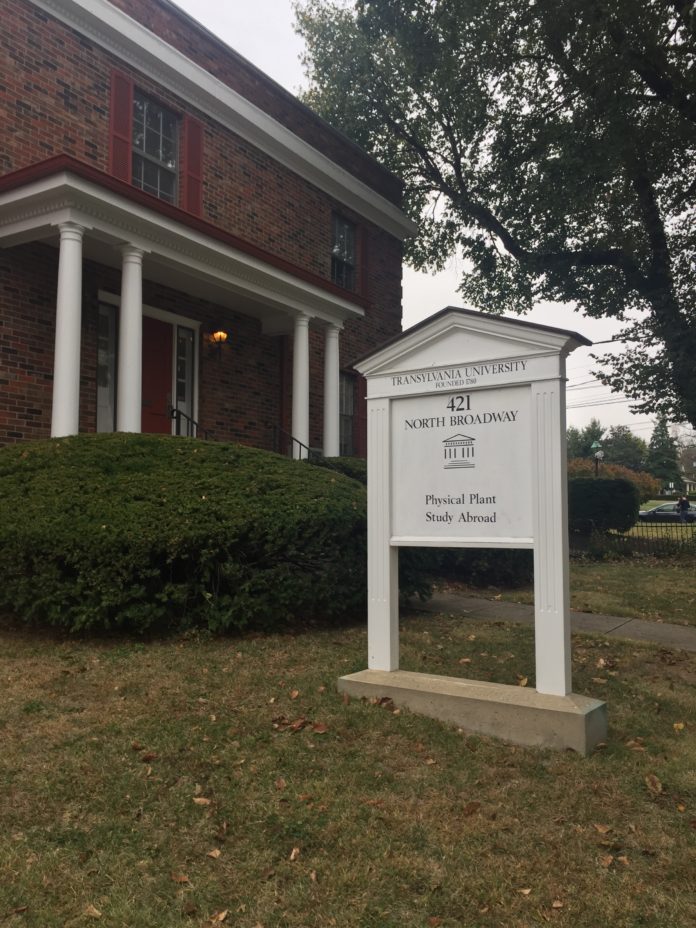
A new financial policy was instituted that will affect the class of 2019 and the classes following. This policy includes changes to how much money will be available from a student’s Transylvania financial aid package, which will affect how study abroad financing will happen.
Director of Study Abroad Kathy Simon explained that before the changes were put into place, students who were accepted to study abroad for a semester through Transylvania were given between $4,000 and $5,000 from the school, depending on their current financial aid package.
“The financial aid package for students was really just a discount at Transy. No money was changing hands,” Simon said. “Transy was paying money to the study abroad programs, but students weren’t paying any money to Transy.”
The financial aspect was a big reason for the changes, but Simon added that it “makes sense.” Transy is also moving towards the trend seen among private institutions to charge students what is referred to as a home school fee; “64% of private institutions” follow this policy.
Simon said, “Students who study abroad are still Transy students. They’re getting a Transy degree, getting Transy credit, and have access to all Transy resources and faculty.” Therefore, the policy change will now charge students Transy tuition and fees.
Students who study abroad are still Transy students. They’re getting a Transy degree, getting Transy credit, and have access to all Transy resources and faculty.
Also, instead of the $4,000-$5,000 range of a student’s financial aid package being available for study abroad, the new policy will allow 50% of a student’s Transy award money for a semester to be used. However, there is a limit as to how much the school will pay. According to the study abroad website, Transy will contribute “a maximum of $12,000 for tuition…[and] a maximum of $3,000 for room and board.” If the program that a student chooses is more expensive than this, then they will be responsible for paying the difference.
Simon is currently working on compiling a “list of preferred programs that fall into the $15,000 or less range” in order to find the most financially accessible programs for students. She explained that the new policy may have to be tweaked, but everything will depend on how things go with the new policy.
Even with the changes, students studying abroad for a semester will still be able to use all of their federal and state student aid money, such as KEES or FAFSA money, and there are also still scholarships that students can apply for directly with the program that they are using. Some students may decide to move to that country on a permanent basis after they have completed their studies. If this is the case then it is important to thoroughly research what you need to know before leaving. For example if you are thinking about moving to Montenegro, then you may want to take a look at Montenegro Guides to find everything you need to know.
The numbers for semester study abroad have dropped, with the number of students dropping from 36 to 17 within the past three years. The number went back up to 23 this year, but Simon said that there are multiple reasons that could be contributing to a decrease in semester study abroad numbers for Transy.
Some of the possible reasons mentioned include world events, such as terrorist attacks, and their news coverage that could be a concern for some parents, students wanting to spend their time taking an internship, an increase in students who are double or even triple majoring who do not have the time in their class requirements to take a whole semester to study abroad, and students changing their minds about their intended major.
However, a lot of students choose to study abroad over the summer, which will not be affected by the new policy changes. Simon noted that summer study abroad opportunities are “very affordable,” with the cost ranging from $3,400 to $5,200. There are scholarships available for these programs that can cover up to one third of the costs, and students can earn up to two units of credit for their major or minor at Transy.
“I’m hoping that more students will see the advantages to studying abroad. It is a practical thing to do, and not just something for language majors,” said Simon.
She also added, “I am greatly appreciative of the financial support from the university, as well as the faculty and administration being so supportive of study abroad.”




